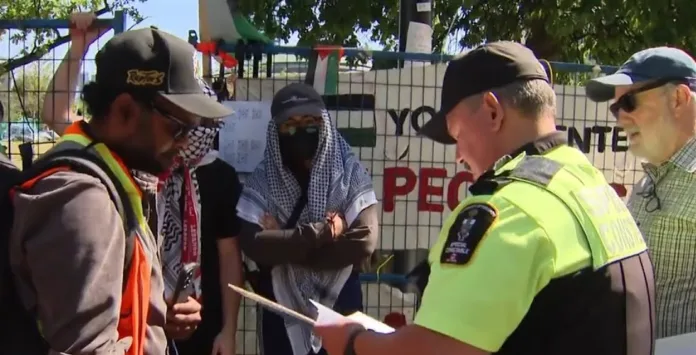Students resist university orders to vacate encampment, demand U of T cut ties with Israeli institutions
Pro-Palestinian protesters at the University of Toronto remain resolute despite facing eviction orders to vacate their encampment by Monday morning. The demonstrators, who have occupied a section of the campus since May 2, received trespassing notices on Friday, giving them until 8 a.m. Monday to leave.
Protesters expressed scepticism that police would be called in to enforce the order, arguing that it would take the university days to obtain the necessary legal clearance. On Sunday morning, the students held a press conference reiterating their demands for the university to sever all ties with Israeli institutions and companies that support Israel. They accused the university of using student tuition to fund military equipment used by Israel, a claim the university has denied.
The university has stated it will take steps to clear the encampment by Monday morning. Officials and student representatives met around 5 p.m. Sunday to discuss the situation. The protesters planned to present a counter-offer to the university’s proposal, which they criticized for not meeting their demands.
The encampment, referred to by some as “Little Gaza,” symbolizes the students’ solidarity with Palestine. Demonstrators have called on the university to pick a side between what they describe as “justice or genocide.” They demand that U of T divest from companies profiting from Israel’s actions in Gaza.
As of Sunday night, no updates had been issued by either the protesters or the university. Protesters remain steadfast in their cause, vowing not to move until their demands are met. The looming Monday morning deadline has heightened tensions, with both sides preparing for the next steps.
U of T’s administration has emphasized the need to maintain order and safety on campus. The university made a proposal on Thursday aimed at addressing some of the protesters’ concerns, but it fell short of their expectations. The students’ counter-proposal, presented on Sunday, includes a list of demands intended to push the university towards divestment.
The situation has garnered significant attention, with 188 comments on a recent article discussing the encampment. Public opinion is divided, with some supporting the students’ cause and others advocating for the enforcement of the eviction order.
The protesters argue that their actions are in line with a broader global movement to hold institutions accountable for their ties to Israel. They aim to increase pressure on the university to take a stand on the issue, aligning with similar protests worldwide.
Meanwhile, the university maintains that it has not directed students to stop protesting but insists that any demonstrations must be respectful, peaceful, and compliant with university codes of conduct. The administration has highlighted the need to balance the right to protest with maintaining a safe and orderly campus environment.
The outcome of this standoff will likely have lasting implications for the university’s policies and its relationship with its student body. As the eviction deadline approaches, the situation remains fluid, with both sides bracing for potential confrontations and legal challenges.
Analysis:
The ongoing protest at the University of Toronto highlights the intersection of student activism, institutional governance, and international politics. The students’ demands for divestment from companies supporting Israel reflect a broader movement advocating for Palestinian rights. This protest is part of a global wave of activism aimed at holding institutions accountable for their financial and political ties.
Politically, the protest underscores the growing influence of student activism in shaping university policies. The demonstrators are leveraging their position to push for significant changes in the university’s investment strategies and affiliations. This pressure challenges the administration to respond not only to immediate safety concerns but also to broader ethical considerations.
Sociologically, the encampment represents a collective action where students unite to advocate for a cause they believe in deeply. The protest highlights the power of grassroots movements in academic settings, where students use their platforms to bring attention to global issues. The university’s response to the encampment will likely influence its reputation among current and prospective students.
Economically, the protesters’ call for divestment has financial implications for the university. Divesting from companies that support Israel involves reevaluating investment portfolios and potential financial losses. However, it also aligns with ethical investment principles, which prioritize social responsibility over profits.
Locally, the protest affects the university’s daily operations and the campus community. The presence of the encampment disrupts normal activities and raises safety concerns. The university’s efforts to balance these disruptions with the right to protest reflect the complexities of managing large, diverse institutions.
From a cultural perspective, the protest taps into broader narratives of justice, human rights, and solidarity. The students’ framing of their demands as a choice between “justice or genocide” invokes powerful moral arguments. This rhetoric aims to mobilize support and draw attention to the perceived injustices faced by Palestinians.
The theoretical perspectives relevant to this protest include social movement theory and theories of institutional change. Social movement theory examines how grassroots activism can influence public opinion and policy. Theories of institutional change explore how organizations adapt to external pressures and evolve in response to new challenges.
In conclusion, the standoff at the University of Toronto is a multifaceted issue involving political, social, economic, and cultural dimensions. The outcome will not only affect the immediate situation on campus but also set a precedent for how similar protests are handled in the future. The university’s response will be critical in navigating the balance between maintaining order and respecting the right to protest
